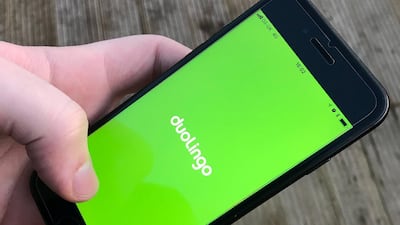The popular language learning platform Duolingo is launching an Arabic course for English speakers.
Arabic has long been one of the most requested languages to be added to the portfolio. The course is now in development, due to launch on March 1 next year on both the app and website.
Duolingo was founded by Luis von Ahn, the inventor of CAPTCHAs, the common test for computers to determine whether a user is a human or robot. Valued at US$700m (Dh2.57 billion), the platform uses “gamification” techniques to encourage learning. For example, a user complete levels as well as winning and losing points for correct or wrong answers. About 15 per cent of users finish a Duolingo course, at which point they should have a good grasp of the language but are unlikely to be completely fluent.
The full content of the Arabic course is not known at this stage but Duolingo has said there will be an effort to include culturally relevant sentences.
Duolingo is hugely popular in the Middle East and Africa, with 13.3m users and more than 12m Arabic speakers learning English on the app and website.
The Arabic course is currently in the “incubator” stage, Duolingo-speak for the development of language lessons by fluent volunteers.
Gina Gotthilf, the company's vice president of growth, believes the course could become one of the most popular courses.
“We are really excited about the launch of Arabic. It’s a language that has been highly requested for a while,” she says.
“We really think that it’s going to be a big one. We really think a lot of people are going to want to learn Arabic based on how many people learn it across the world and based on the interest we have received.”

Duolingo, which counts Google and actor Ashton Kutcher as investors, currently has 200m users worldwide and reports that there are more people learning languages on Duolingo in the US than there are learning languages in the entire US public school system.
Ruth Ahmedzai Kemp, a teacher of Arabic and translator for Puffin Books, warns that there are “few shortcuts” to learning Arabic vocabulary as an English speaker.
“Some learners find the script difficult to decipher, and the grammatical structures are certainly different from English, but with the challenge comes satisfaction and fascination,” Ms Ahmedzai Kemp says, adding that students can lose confidence if overloaded with too much vocabulary and too many complicated structures too early.
She believes Duolingo is a good tool for both students and for teachers, but cautions “no one approach on its own is entirely effective and in order to learn to pronounce Arabic properly and develop listening skills, students do benefit from conversation with a real native speaker, even if it's not a regular lesson or a traditional classroom format”.
Many of the volunteers working on this project had pushed for Spanish, Swedish, German and French courses for Arabic speakers at the outbreak of the European migrant crisis.
“When [the team saw] there were Arabic-speaking refugees in Europe during the crisis, they were trying to really quickly work out how to launch all these courses so these people could learn the languages of these countries that they were travelling to,” Ms Gotthilf says.
The crisis saw more than 1m flee from countries including Syria, Iraq and Afghanistan in 2015 alone. The flow of people to Europe to escape conflict in their home countries has continued over the years, with each summer seeing a surge in migrants and refugees risking their lives to cross over to the continent. Most are forced to discard their possessions but many fight to keep one item in particular - their smartphone.
Duolingo, whose app is free, say they saw surges in Arabic speakers taking up courses in European languages during these peak periods but cannot pinpoint exactly how many of these users were refugees.
In September 2015, when Duolingo first began introducing these courses, they reported that more than 330,000 Arabic speakers signed up in that month alone, in August 2016 around 360,000 Arabic speakers registered, and in July 2017 more than 400,000 Arabic speakers registered in that month.
“Education is more accessible than it’s ever been because it now doesn’t depend on a classroom or access to a really good teacher ... for the first time now you can actually access education in your pocket wherever you are as long as you have internet,” says Ms Gotthilf.
She believes Duolingo’s access to data is what makes the product so effective and as a result so popular. The company uses A/B testing, a method of testing two versions of a product on two different groups to see which performs better.
“You can actually see these people were able to progress more quickly, they stayed on longer, were able to retain the information better and pass the tests. It’s an example of how, when we are making these tiny tweaks, we can actually figure out how to be more effective about how we are teaching."

